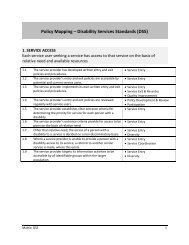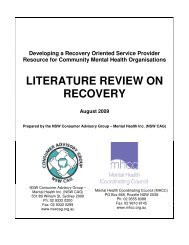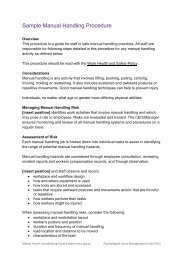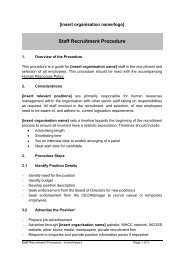Running on Empty (pdf) - Psychminded
Running on Empty (pdf) - Psychminded
Running on Empty (pdf) - Psychminded
Create successful ePaper yourself
Turn your PDF publications into a flip-book with our unique Google optimized e-Paper software.
<str<strong>on</strong>g>Running</str<strong>on</strong>g> On <strong>Empty</strong>Building Momentum to Improve Well-Being in Severe Mental IllnessExecutive SummaryIn the UK, two in 100 people will experience severe mentalillness (SMI) at <strong>on</strong>e time in their life. 1,2 In additi<strong>on</strong> to mentalhealth problems, those living with SMI are also significantlymore at risk than the general populati<strong>on</strong> of developingmajor physical health-related issues as a c<strong>on</strong>sequence of theirillness itself, the lifestyle they are often forced to lead becauseof their socio-ec<strong>on</strong>omic circumstances and the way theirc<strong>on</strong>diti<strong>on</strong> is managed by the healthcare professi<strong>on</strong> team.Significantly higher incidences of cancer, cardiovasculardisease, type 2 diabetes, obesity and HIV/AIDS translate intorates of premature death which are up to three times higherthan the general populati<strong>on</strong>. 3 On average, those with SMI diebetween ten to 15 years earlier. 4 In order to address thesephysical health issues, there is an urgent need to ensure thata holistic, supportive, choice-driven approach is widelyadopted into the everyday provisi<strong>on</strong> of care and delivered byall healthcare professi<strong>on</strong>als. This approach aims to supportpeople affected by SMI to improve their quality of life andtherefore reduce the inevitable mortality rates.Despite this need being well-documented in clinical researchand numerous government guidelines directing how careshould be delivered, recent survey data collected for the<str<strong>on</strong>g>Running</str<strong>on</strong>g> <strong>on</strong> <strong>Empty</strong> report suggest that <strong>on</strong>ly around half ofGPs provide lifestyle advice <strong>on</strong> healthy eating, weightmanagement or exercise. 5 Another survey run in parallel,reveals that many of those affected by SMI are often nothaving routine assessments such as blood pressure andblood glucose tests or are not being provided with weightmanagement or lifestyle advice. 6In light of this, the <str<strong>on</strong>g>Running</str<strong>on</strong>g> <strong>on</strong> <strong>Empty</strong> report has beendeveloped by a group of 14 multi-disciplinary healthcareprofessi<strong>on</strong>als, six charities and professi<strong>on</strong>al organisati<strong>on</strong>s.to review the issues faced by people with SMI, assess theinfluences <strong>on</strong> health care practice and present a series ofrecommendati<strong>on</strong>s to improve the provisi<strong>on</strong> of care and helpinstil an improved level of c<strong>on</strong>fidence am<strong>on</strong>gst those livingtheir lives with severe mental illness. The following call toacti<strong>on</strong> has been set-out.A Call to Acti<strong>on</strong>■■■The healthcare professi<strong>on</strong>al team should strive to addressall the health-related issues experienced by those withSMI with a holistic approach that takes into account theentire well-being (physical and mental health and lifestyle)of the individual. Failure to do so can have a seriouseffect <strong>on</strong> quality of life and ultimately, may even lead topremature deathThe aim of therapeutic interventi<strong>on</strong> – undertaken <strong>on</strong> anindividual basis through two-way c<strong>on</strong>sultati<strong>on</strong> with thosein care – should be to allow the mental state of thosewith SMI to be effectively stabilised so that they canbegin to proactively become engaged in their own overallwell-being in partnership with their healthcare professi<strong>on</strong>alAlthough at times, those with SMI may be difficult toengage, their rights to a supportive, choice-driven andintegrated programme of care must not be compromisedduring any stage of the care“The fluctuating nature of serious mentalillness can lead people to neglect theirphysical health, which may in turn furtherdiminish their quality of life. SANE has l<strong>on</strong>gcalled for a holistic approach to seriousmental illness, and we welcome this report,which highlights the need for the physicalhealth of people with serious mental illnessesto be fully catered for.”Marjorie Wallace MBE, Chief Executive, SANE3
<str<strong>on</strong>g>Running</str<strong>on</strong>g> On <strong>Empty</strong>Building Momentum to Improve Well-Being in Severe Mental IllnessChris ManningDr Chris Manning was an NHS GP until 1999, when he tookearly retirement <strong>on</strong> health grounds, having had majordepressi<strong>on</strong> since 1986. He works in the mental healthvoluntary sector with Depressi<strong>on</strong> Alliance and Primhe (Primarycare Mental Health and Educati<strong>on</strong>); the latter as its founder-CEO. He serves <strong>on</strong> the nati<strong>on</strong>al mental health taskforce andthe NIMHE advisory boards <strong>on</strong> mental health promoti<strong>on</strong> andanti stigma and discriminati<strong>on</strong>. His core value in life is “Nothingis impossible if people do not have to claim the credit for it.”Ian McPhers<strong>on</strong>Dr Ian McPhers<strong>on</strong> took up post as Director of the WestMidlands Development Centre for the Nati<strong>on</strong>al Institute forMental Health in England (NIMHE West Midlands) inOctober 2002. A Clinical Psychologist by professi<strong>on</strong>albackground, Ian worked as a practiti<strong>on</strong>er, researcher andtrainer, before moving into service development andmanagement. He then had 9 years of Board level resp<strong>on</strong>sibilityas Director of Mental Health in two large Community Trusts.Through this he gained significant experience of managingchange in the delivery of services, in rec<strong>on</strong>figuring andintegrating health and social care organisati<strong>on</strong>s and inimproving links between primary care and specialist services.He has a l<strong>on</strong>gstanding clinical and research interest indealing with mental health problems in primary care and inimproving the quality of experience of people using servicesat that level. Within NIMHE he has been joint lead Director forthe Primary Care Mental Health Programme.completed a doctorate in cardiovascular physiology.His clinical work is in liais<strong>on</strong> psychiatry, with particularinterests in chr<strong>on</strong>ic pain and fatigue. He teaches andresearches <strong>on</strong> the topics of psychological problems relatedto physical illness, medically unexplained symptoms, and thedetecti<strong>on</strong> and management of comm<strong>on</strong> mental disorders ingeneral health care settings. He also has a research interestin self-care in chr<strong>on</strong>ic disease and adherence to treatment.He has published many papers and chapters in these fields,and recently co-edited a book <strong>on</strong> planning specialist servicesin liais<strong>on</strong> psychiatry. He is <strong>on</strong> the editorial board of theJournal of Psychosomatic Research. He is a past member ofthe Primary and Community Care and PharmaceuticalsPanels of the UK Health Technology Assessment Programme.Michelle RowettMichelle Rowett is Chief Executive of the Manic Depressi<strong>on</strong>Fellowship, the nati<strong>on</strong>al user-led organisati<strong>on</strong> for people whoare affected by manic depressi<strong>on</strong> (bipolar disorder). She hasbeen Chief Executive since 2000, although she has beenwith the Fellowship since 1994. During this time, theFellowship has more than doubled its turnover, trebled itsstaff and gained a reputati<strong>on</strong> for innovative work in enablingpeople affected by manic depressi<strong>on</strong> to gain c<strong>on</strong>trol overtheir lives.Prior to joining the Fellowship, she worked for the CharityCommissi<strong>on</strong>. Michelle has a degree in History, and hascompleted the Open University postgraduate certificate involuntary sector management.John PendleburyJohn completed his basic nurse training nearly 30 years agoand started working as a Community Psychiatric Nurse(CPN) in 1984. He has completed courses in behaviouralpsychotherapy, community psychiatric nursing, and aPostgraduate Diploma and Master of Science degree inPractiti<strong>on</strong>er Research. John has spent most of his timeworking in the community. At the request of several of hispatients, he set up a weight management clinic at CromwellHouse in May 2000. He has a special interest in the generalphysical health issues associated with severe mental illness.Robert PevelerRobert Peveler is currently Professor of Liais<strong>on</strong> Psychiatryand Head of the Mental Health Clinical Group at theUniversity of Southampt<strong>on</strong>, where he has worked for twelveyears. He is also an h<strong>on</strong>orary c<strong>on</strong>sultant in the HampshirePartnership NHS Trust. He previously held posts asWellcome Trust Research Fellow and Clinical Lecturer atthe University of Oxford, where he trained in medicine andpsychiatry. Before embarking <strong>on</strong> his clinical career heGary SullivanGary graduated from Medical School in Cardiff in 1982, anddid GP training in the Welsh Valleys, obtaining the MRCGP in1986. He then changed track and trained as a psychiatrist inSouth Wales, obtaining MRCPsych in 1993. He was appointedas C<strong>on</strong>sultant Psychiatrist in North Glamorgan NHS Trust in1997, Clinical Director for Mental Health since 2000 andExternal Professor of Psychiatry at the University of Glamorganin 2004. His current research interests include Mental Healthservice development, and Liais<strong>on</strong> Psychiatry.Jogin ThakoreJogin holds a dual appointment, as a Clinical Psychiatrist atthe Neuroscience Centre, St. Vincent’s Hospital, Fairview,and as a Senior Lecturer in Psychiatry in the Department ofPsychiatry at the Royal College of Surge<strong>on</strong>s in Ireland. Hisalma mater is Trinity College, Dublin (MB, Bch, BAO, BA) andhis training was initially in Ireland though went to L<strong>on</strong>d<strong>on</strong>early in his career where he obtained his PsychiatricMembership (MRCPsych) and a PhD in Psychiatry with theUniversity of L<strong>on</strong>d<strong>on</strong>. On returning to Ireland he was awarded5
C<strong>on</strong>tributorsmembership of the Royal College of Physicians of Ireland(MRCPI). His principal area of research is to examinemetabolic, stress axis, neurophysiological and metabolicchanges, in those suffering from schizophrenia. Jogin and histeam collaborate with Dermot Kenny in ClinicalPharmacology at the Royal College of Surge<strong>on</strong>s in Ireland.They have set up a laboratory which will measure EvokedRelated Potentials at St. Vincent’s Hospital in collaborati<strong>on</strong>with John Foxe at the Nathan Kline Institute and IanRoberts<strong>on</strong> at the Trinity College Institute of Neurosciences.Andre TyleeProfessor Andre Tylee worked for twenty years as a generalpractiti<strong>on</strong>er in South L<strong>on</strong>d<strong>on</strong> developing his practice frombeing single-handed when he arrived to having four partners,two trainee doctors and two salaried doctors when he left totake up the first Chair in Primary Care Mental Health in theworld in 2000. The Chair and Secti<strong>on</strong> of Primary Care MentalHealth is based at the renowned Institute of Psychiatry, KingsCollege, L<strong>on</strong>d<strong>on</strong>. Professor Tylee runs the Primary care R+Dprogramme for the Institute of Psychiatry and the MaudsleyHospital which is rated as str<strong>on</strong>g by the Department of Health.Professor Tylee also chairs the Primary Care Programme ofthe Nati<strong>on</strong>al Institute of Mental Health in England (NIMHE)which runs nati<strong>on</strong>al programmes <strong>on</strong> commissi<strong>on</strong>ing, coreskills training, leadership, user empowerment, Research andDevelopment, Workforce (new workers) and Integrated care.He also invented the internati<strong>on</strong>ally acclaimed “Trailblazers”teach the teacher programme which has over 400graduates in England and is being started in the USA,New Zealand and Australia in 2005. He hold an h<strong>on</strong>oraryChair at M<strong>on</strong>ash University, Melbourne. He edits PrimaryCare Mental Health Journal and advises numerous mentalhealth charities. He has published widely in journals andtextbooks, mainly <strong>on</strong> the recogniti<strong>on</strong> and management ofdepressi<strong>on</strong> in primary care.Marjorie WallaceMarjorie Wallace, MBE, is the Chief Executive of SANE UKand an award-winning investigative journalist, author andbroadcaster who has worked with ITV and the BBC as areporter and film director. As founder and Chief Executive,her resp<strong>on</strong>sibilities include mental health campaigningactivities, The Prince of Wales Internati<strong>on</strong>al Centre forSANE Research, for which she raised £6 milli<strong>on</strong>, andSANELINE. Marjorie has received a BA in psychology andphilosophy, an H<strong>on</strong>orary Doctorate of Science from CityUniversity, an ‘Award for Public Service’ from the BritishNeuroscience Associati<strong>on</strong> and is an H<strong>on</strong>orary Fellow of theRoyal College of Psychiatrists. The Daily Mail cited Marjorieas <strong>on</strong>e of ‘Britain’s 100 most influential women’ in 2003and SAGA Magazine readers voted her as the 3rd “Wisest”pers<strong>on</strong> in 2005.Elaine West<strong>on</strong>Elaine West<strong>on</strong> has a BSC in Pharmacy from De M<strong>on</strong>tfortUniversity where she studied from 1976 – 79. She joinedSt James University Hospital Leeds as a post graduatestudent and was appointed as a resident <strong>on</strong>-call pharmacistfor three years before taking up her post as Staff Pharmacistfor Meanwood Park Hospital (Learning Disabilities) in 1983.Following this, she c<strong>on</strong>ducted sessi<strong>on</strong>al work for LeedsNorth East PCT and enjoyed several different posts in Leedsincluding Community services Pharmacist, Patient ServicesManager at St James University Hospital and latterly PostGraduate Pharmacist manager at Leeds Acute HospitalsTrust. Since 2002 she has been appointed as the ChiefPharmacist at Leeds Mental Health Teaching Trust. Elaine isa member of the UK Psychiatric Pharmacists Group.David YeomansDr David Yeomans is a psychiatrist in Leeds and an h<strong>on</strong>orarysenior lecturer at the University of Leeds. He lectures andwrites <strong>on</strong> examinati<strong>on</strong> techniques for postgraduate doctors.He set up and works in the innovative multi-agency mentalhealth service, CHOICE (recently described in the HealthService Journal). He has been a lead c<strong>on</strong>sultant in the Well-Being Support Programme – a nati<strong>on</strong>al programme ofsystematic health improvement for people with severe mentalillness. He has seen at first hand the benefits of activelyengaging people with the Well-Being Support Programme.These include early detecti<strong>on</strong> of potentially fatal illnesses andeffective reducti<strong>on</strong> in cardio-respiratory risk factors such asbeing overweight, smoking and inactivity. Other gainsreported by service users are improved self-esteem, betterunderstanding of their own health and enjoying the n<strong>on</strong>mentalhealth focus in their care plans.Professor Allan YoungProfessor Allan Young trained in medicine and thereafterpsychiatry at the University of Edinburgh and held a RoyalCollege of Physicians of Edinburgh training fellowship at theMRC Brain Metabolism Unit. Subsequently, he was a clinicallecturer at the University of Oxford and the MRC ClinicalPsychopharmacology Unit. Currently Professor of GeneralPsychiatry, Allan Young is also Director of both Psychiatryand the Stanley Research Centre at the University ofNewcastle up<strong>on</strong> Tyne, and Head of the Academic MentalHealth Unit. He is a Council Member and Secretary ofExternal Affairs of the British Associati<strong>on</strong> forPsychopharmacology; Secretary of the Royal College ofPsychiatrists’ Psychopharmacology Special Interest Group;Member of the Executive Committee, Faculty of General andCommunity Psychiatry, Royal College of Psychiatrists; and amember of the Scientific Advisory Council of the StanleyMedical Research Institute. He has published extensively <strong>on</strong>the aetiology and treatment of psychiatric disorders,particularly mood disorders.6
<str<strong>on</strong>g>Running</str<strong>on</strong>g> On <strong>Empty</strong>Building Momentum to Improve Well-Being in Severe Mental IllnessSecti<strong>on</strong> 1: The Scale of the ProblemPrevalence of Severe Mental Illness andMajor Physical Health IssuesAt some point in their life, as many as two out of a hundredpeople in the UK al<strong>on</strong>e will experience SMI and milli<strong>on</strong>s ofpeople around them will be affected. 1,2 Unfortunately, thoseaffected by SMI – namely those with schizophrenia andbipolar disorder – will not <strong>on</strong>ly experience a wide range ofsymptoms related to their mental health, but will also beaffected by physical well-being issues which can translateinto premature rates of death that are up to three timeshigher than the rest of the populati<strong>on</strong>. 3Some of the most comm<strong>on</strong> well-being issues for peoplewith SMI include: cardiovascular disease, obesity, type 2diabetes, sexual health problems, stroke, osteoarthritis,hyperprolactinaemia, dental problems, HIV/AIDS,hepatitis C, respiratory problems, irritable bowel syndromeand some cancers. 3,4,7,8■■“Well-being does not begin and end with apers<strong>on</strong>’s mental state – all aspects of healthare important. Our aim should be to achieve abalance between c<strong>on</strong>trolling mental state withmedicati<strong>on</strong> and other therapies and takingaccount of all other aspects of health.”Professor Robert Peveler, Professor of Liais<strong>on</strong> Psychiatry,University of Southampt<strong>on</strong>Cardiovascular DiseaseThe prevalence of cardiovascular disease (CVD) inpeople with SMI, is known to be higher than the generalpopulati<strong>on</strong>. 3,4 In people living with schizophrenia, CVD isthe single largest cause of mortality am<strong>on</strong>gst males andfemales. 9 A recent study of those undergoing l<strong>on</strong>g-staypsychiatric care found that 48 per cent of males and9 per cent of females may also be at risk due tohypertensi<strong>on</strong>. 10 Mortality due to ischaemic heart disease,cardiac arrhythmias and myocardial infarcti<strong>on</strong> is alsohigher in people with SMI. 3,4Weight Gain and ObesityWeight gain is comm<strong>on</strong> am<strong>on</strong>g people with SMI. In ahospital sample of those undergoing l<strong>on</strong>g-stay psychiatriccare, 36 per cent of men and 75 per cent of women wereshown to be obese, compared with rates of 17 per centin men and 22 per cent in women am<strong>on</strong>gst the generalUK populati<strong>on</strong>. 10 Reas<strong>on</strong>s for this increase may be due toa combinati<strong>on</strong> of lifestyle and medicati<strong>on</strong> which are both■addressed later in the report. Whilst the latter may beassociated with an undesirable degree of weight gain,there are marked differences in the extent of weightchange observed between individuals.Type 2 DiabetesMany studies have reported that impaired glucosetolerance and insulin resistance are more comm<strong>on</strong>am<strong>on</strong>gst those living with SMI than the generalpopulati<strong>on</strong>. 3,4 Type 2 diabetes has also been foundto be up to 5 times more comm<strong>on</strong> in those with SMI,in comparis<strong>on</strong> with the general populati<strong>on</strong>. 11,12This suggests that an intrinsic risk between diabetes and SMImay exist. Although this relati<strong>on</strong>ship requires additi<strong>on</strong>al clinicalresearch to prove, it is likely to be predominantly genetic andenvir<strong>on</strong>mental with other potential factors including somepossible effects of medicati<strong>on</strong> also playing a role.■“Diabetes is not being picked up earlyenough through rigorous screening acrossthe board. In additi<strong>on</strong>, people with SMI mayalso find it harder to access healthcarebecause of their c<strong>on</strong>diti<strong>on</strong>.”Dr Richard Holt, Senior Lecturer in Endocrinology andMetabolism, University of Southampt<strong>on</strong>“Current research suggests a genetic linkbetween diabetes and schizophrenia. Typically,up to 30 per cent of people with schizophreniahave a family history of diabetes, which issignificantly higher than the general populati<strong>on</strong>.”Dr Richard Holt, Senior Lecturer in Endocrinology andMetabolism, University of Southampt<strong>on</strong>HIV and AIDSThe incidence of HIV/AIDS in people with schizophrenia,is estimated at between four and 23 per cent – a muchhigher figure than that seen in the general populati<strong>on</strong>. 3C<strong>on</strong>nected factors may be the higher rates of unsafe sexpracticed with multiple partners and intravenous drugmisuse which often occur am<strong>on</strong>gst those affected bySMI. 3,7 In additi<strong>on</strong>, sexual exploitati<strong>on</strong> of these vulnerableindividuals (especially those with schizophrenia) who livein group situati<strong>on</strong>s – such as group care homes, hostelsor <strong>on</strong> the street, is also comm<strong>on</strong>. 77
<str<strong>on</strong>g>Running</str<strong>on</strong>g> On <strong>Empty</strong>Building Momentum to Improve Well-Being in Severe Mental IllnessAlcohol and drug abuse are also a c<strong>on</strong>siderable problem inthe SMI populati<strong>on</strong>. Nearly 35 per cent of those living withschizophrenia abuse alcohol at some point in their lives, eventhough alcohol use can worsen psychotic symptoms andmedicati<strong>on</strong> side-effects, such as extra pyramidal symptoms. 7The UK figures for drug and alcohol problems in individualswith SMI show that over the course of a year, 36 per centhave some form of substance misuse problem and whenbroken down, 32 per cent of these account for alcoholdependence and 16 per cent for drug problems. 16“Research indicates that you simply do not liveas l<strong>on</strong>g with SMI as you do without. Inadditi<strong>on</strong> to lifestyle, diet issues andmedicati<strong>on</strong>, many of those affected selfmedicateto c<strong>on</strong>trol their anxiety with alcohol,nicotine and cannabis.”Ian Hulatt, Mental Health Adviser, Royal College of NursingBetween 15 per cent and 60 per cent of those withschizophrenia also abuse psychoactive drugs such as cocaine,which is a higher number than am<strong>on</strong>g those of the generalpopulati<strong>on</strong>. 7 As expected this can lead to a lack of compliancewith treatment, resulting in a heightened risk of relapse. 7“There is current emphasis <strong>on</strong> recovery fromSMI. Sec<strong>on</strong>dary to this is physical health careand lifestyle management. You can notseparate mental and physical health in such afundamental way. For us not to recognise this,we are not providing a holistic approach tocare and are providing a disservice to peoplewith SMI as we need to look at treating thewhole pers<strong>on</strong>.”Elizabeth Gale, Director, mentalityindividual basis and are potentially associated with a range ofside effects. The Questi<strong>on</strong> of Choice survey, undertakenjointly by MIND, Rethink and the MDF The BiPolarOrganisati<strong>on</strong> found that the most prevalent physical sideeffectsof antipsychotic medicati<strong>on</strong> were weight gain(62 per cent) and effects <strong>on</strong> the eyes (38 per cent). 17“All medicati<strong>on</strong> can be associated with sideeffects, but by simply switching treatment thisdoes not ensure those taking the medicati<strong>on</strong>will not experience the same side effects orindeed develop new <strong>on</strong>es.”“When people are mentally well and stable <strong>on</strong> amedicati<strong>on</strong>, when you change treatment yourun the risk of destabilisati<strong>on</strong> as a result andtherefore render the individual more incapableof tackling lifestyle issues.”John Pendlebury, Community Psychiatric Nurse, SalfordRecent studies suggest that effectiveness is <strong>on</strong>e of the mostimportant aspects to c<strong>on</strong>sider when choosing a medicati<strong>on</strong>. 18Those with SMI often require l<strong>on</strong>g-term maintenancetreatment for their c<strong>on</strong>diti<strong>on</strong> and therefore relapse preventi<strong>on</strong>and restorati<strong>on</strong> of social functi<strong>on</strong> are c<strong>on</strong>sidered to be themost important results of successful therapy. 18 Both of theseoutcomes are inextricably linked to efficacy of treatment.“People with SMI are treated with medicati<strong>on</strong>for a l<strong>on</strong>g durati<strong>on</strong> of time, potentiallyindefinitely. It is these individuals who requiregreater management for their illness becausetheir overall physical and psychiatric well-beingis most at risk.”Dr Richard Holt, Senior Lecturer in Endocrinology andMetabolism, University of Southampt<strong>on</strong>The Role of Medicati<strong>on</strong>Severe mental illness is a c<strong>on</strong>diti<strong>on</strong> that normally requiresl<strong>on</strong>g-term medicati<strong>on</strong>. The aim of therapeutic interventi<strong>on</strong>with medicati<strong>on</strong> is to allow the mental state of those with SMIto be effectively stabilised so that they are better able toreintegrate into society and lead normal lives. However,all medicines vary in their level of effectiveness <strong>on</strong> an“A proactive approach to medicati<strong>on</strong> sideeffectsshould be taken, not just m<strong>on</strong>itoringthe effects but dealing with them.”Dr David Yeomans, C<strong>on</strong>sultant Psychiatrist,University of LeedsAlthough medicati<strong>on</strong> may have side effects, it is not alwaysadvisable to switch treatment if it is effective and associated9
Secti<strong>on</strong> 1: The Scale of the Problemwith a low risk of relapse. If SMI is managed through effectivesymptom reducti<strong>on</strong>, people with SMI are better placed toundertake a well-being approach and actively choose towork <strong>on</strong> those areas of their life requiring attenti<strong>on</strong>. Thosetaking medicati<strong>on</strong> should also be made aware of anypotential side-effects and provided with informati<strong>on</strong> <strong>on</strong> howto manage and minimise the effects should they occur.However, should the side-effects of any given medicati<strong>on</strong> bec<strong>on</strong>sidered unacceptable by either the individual taking orthose prescribing therapy, alternative opti<strong>on</strong>s should always bediscussed and attempted. It is <strong>on</strong>ly through these discussi<strong>on</strong>sthat improved relati<strong>on</strong>ships and levels of trust can be fosteredbetween the healthcare professi<strong>on</strong>als and those in their care.“All drugs have side effects therefore it is not<strong>on</strong>ly a questi<strong>on</strong> of ensuring well-being islooked after in every pers<strong>on</strong> receivingtreatment, but to improve medicati<strong>on</strong>management as well. Those under careshould be warned in advance of treatment,the side-effects they may expect and behelped to manage these side-effects.”Professor Kevin Gournay CBE, Head of PsychiatricNursing, Institute of Psychiatry, L<strong>on</strong>d<strong>on</strong>“Physical health checks and help to manageside-effects are often not being provided inthe first place. They need to be built intoregular reviews of medicati<strong>on</strong> that give peoplethe right to an informed choice about theopti<strong>on</strong>s that enable them to optimise theirquality of life and a sense of physical andmental health well-being.”Paul Corry, Director of Campaign and Communicati<strong>on</strong>s,Rethink“The side effects of drugs have to be balancedagainst the benefits achieved through animproved mental state. As such, efficacyshould guide medicati<strong>on</strong> choice rather thanpossible side effects. Through healthy lifestyleprogrammes it is possible to obviate a lot ofthe potential side effects.”Dr Richard Holt, Senior Lecturer in Endocrinology andMetabolism, University of Southampt<strong>on</strong>Provisi<strong>on</strong> of CareWhen symptoms of SMI such as cognitive impairment, socialisolati<strong>on</strong> and a suspici<strong>on</strong> of the care provider (often driven bypast experiences including secti<strong>on</strong>ing, forced medicati<strong>on</strong> andpers<strong>on</strong>al views being ignored, dismissed or suppressed)combine to leave an individual with SMI disinclined to seek care, ornot c<strong>on</strong>tinue their treatment as directed, provisi<strong>on</strong> of good care issignificantly diminished. In many instances this is not the fault ofthose affected by SMI and as such, healthcare professi<strong>on</strong>alsmust engage “the whole pers<strong>on</strong>” in discussi<strong>on</strong>s about their care.In additi<strong>on</strong>, a lack of social skills may also preclude thoseaffected from being able to effectively communicate clearlyabout a medical problem and even when they do, they may notbe able to accurately c<strong>on</strong>vey their symptoms due to difficulties inexpressing their needs. 19 Research supports this, showing thatthose living with schizophrenia are less likely than people withoutto report physical symptoms sp<strong>on</strong>taneously. 20“People with SMI are too often ignored whenthey present with a physical health issue.Health services are often not sufficientlygeared up to listen to a pers<strong>on</strong> as they wouldany<strong>on</strong>e else and to recognise the importanceof their symptoms.”Dr Ian McPhers<strong>on</strong>, Director, Nati<strong>on</strong>al Institute for MentalHealth in England (NIMHE), West Midlands“People with SMI often feel trivialised byprimary care when they present with a healthissue that c<strong>on</strong>cerns them. They feel <strong>on</strong>ce theyare given their diagnosis they are seen interms of that diagnosis and nothing else.It is important that people with SMI arelistened to and that their c<strong>on</strong>cerns are takenseriously by health care professi<strong>on</strong>als toensure they are then more motivated to carefor their own well-being.”Michelle Rowett, Chief Executive,MDF The BiPolar Organisati<strong>on</strong>However, due to a number of factors such as distrust ofhealthcare professi<strong>on</strong>als because of past experiences,instances do exist where individuals may also be less cooperativethan a member of the general populati<strong>on</strong>, which willlikely act as a barrier between themselves and their healthcareprofessi<strong>on</strong>al team. 21 ‘Diagnostic overshadowing’ could also10
<str<strong>on</strong>g>Running</str<strong>on</strong>g> On <strong>Empty</strong>Building Momentum to Improve Well-Being in Severe Mental Illnessc<strong>on</strong>tribute to the problem, where physical symptoms are seenin terms of the mental health problem and may be perceivedas ‘all in the mind.’ 22 These are invariably costly mispercepti<strong>on</strong>swhich often result in the neglect of real physical c<strong>on</strong>diti<strong>on</strong>s andc<strong>on</strong>tribute to further disengagement from care.“Provisi<strong>on</strong> of care throughout mental healthservices is still far too patchy with skills andcompetencies being extraordinarily variable.In additi<strong>on</strong>, some mental health professi<strong>on</strong>alsand staff are themselves disillusi<strong>on</strong>ed, orburning out, and this further affects theircapacity to deliver those skills andcompetencies that they do have.”Dr Chris Manning, Chief Executive,Primary Care Mental Health Educati<strong>on</strong> (PriMHE)The increased mortality am<strong>on</strong>gst people living with SMIhas been attributed, at least in part, to the substandard medicalcare that they receive. 23 Recent reforms in mental health carehave led to the closure of l<strong>on</strong>g-stay mental hospitals and thedevelopment of community mental heath teams (CMHTs) whichare now expected to meet the whole range of health and socialneeds. 24 Hospital admissi<strong>on</strong>s in SMI are often short andinfrequent and physical healthcare and lifestyle managementare not necessarily given priority. 25 In additi<strong>on</strong>, many mentalhealth care practiti<strong>on</strong>ers have little training in how to managephysical care, the rates of physical assessments of thoseunder care in hospital by junior psychiatrists are poor 25 andthe m<strong>on</strong>itoring of physical health and health educati<strong>on</strong> byCMHT staff is generally unsatisfactory. 26 In additi<strong>on</strong>, healthcareservices are often fragmented and un-coordinated, with bothclinicians and those under care, unaware of available andappropriate resources. 25,26“There are not enough resources or time toimplement guidelines and health promoti<strong>on</strong>around physical health care in those with SMI.People see it as a trimming rather than a basicnecessity of care.“John Pendlebury, Community Psychiatric Nurse, SalfordThe majority of GPs believe that it is their resp<strong>on</strong>sibility tohandle physical health matters and lifestyle managementand it is indeed a key quality indicator in their c<strong>on</strong>tract.However, it is clear there is not enough time or m<strong>on</strong>ey for thisin the primary care provisi<strong>on</strong> of mental health care. As such,for those with SMI who are in c<strong>on</strong>tact with a GP, this doesnot necessarily ensure that they receive good health careeither. The orientati<strong>on</strong> of primary care is reactive, and thisdoes not fit well with those who may be reluctant, or unableto seek help. 24 Short c<strong>on</strong>sultati<strong>on</strong> times make it difficult fordoctors to assess mental state, c<strong>on</strong>duct a physicalassessment and provide lifestyle advice, especially in thoseindividuals who are unsure, unc<strong>on</strong>fident or c<strong>on</strong>fused. 24An added limitati<strong>on</strong> is that up to a third of individuals with SMImay move out of their locality within a year and peripateticlifestyles can make it difficult for services to stay in touch. 16“Services exist for those who use them, notthose who provide them. We need to join upour thinking and working, from GovernmentDepartments right down to the ‘sharp end’and be centred in the reality of the needs,wishes and predicaments of those affected bySMI, their families and cares. Real teamworkleads to greatly improved outcomes for thosereceiving care and the morale and wellbeingof the professi<strong>on</strong>als in those teams.”Dr Chris Manning, Chief Executive,Primary Care Mental Health Educati<strong>on</strong> (PriMHE)“Despite what many health care professi<strong>on</strong>alsthink, people with SMI are c<strong>on</strong>cerned abouttheir physical health. We should therefore beproviding them with effective and appropriatehealth services, looking at well-being acrossthe board.”Elizabeth Gale, Director, mentality“Better coordinati<strong>on</strong> between primary care,psychiatrists and endocrinologists is requiredin order to implement well-being effectively inpractice. Further educati<strong>on</strong> is also required fordoctors, people affected by SMI, their familiesand carers alike <strong>on</strong> the importance of a holisticapproach to care.”Dr Jogin Thakore, C<strong>on</strong>sultant Psychiatrist, St. Vincent’sHospital, Fairview, Dublin11
Secti<strong>on</strong> 1: The Scale of the Problem“It is easy to blame the pers<strong>on</strong> experiencingsymptoms for a lack of self-care, however it isimportant to recognise that when people dopresent with physical problems, healthservices are too ready to ignore symptomsand attribute them to mental health problemsrather than carrying out proper investigati<strong>on</strong>sand identifying the causes.”Dr Ian McPhers<strong>on</strong>, Director, Nati<strong>on</strong>al Institute for MentalHealth in England (NIMHE), West MidlandsLiving C<strong>on</strong>diti<strong>on</strong>s“People <strong>on</strong> low incomes who are without workor homeless are all indicators for poor healthoutcomes regardless of mental health.”Michelle Rowett, Chief Executive,MDF The BiPolar Organisati<strong>on</strong>C<strong>on</strong>clusi<strong>on</strong>sTo c<strong>on</strong>clude secti<strong>on</strong> <strong>on</strong>e, <str<strong>on</strong>g>Running</str<strong>on</strong>g> <strong>on</strong> <strong>Empty</strong> report authorswould like to highlight the following:In additi<strong>on</strong> to living with mental health problems, those withSMI are also significantly more at risk than the generalpopulati<strong>on</strong> of developing major physical health-related issuessuch as cancer, cardiovascular disease, type 2 diabetes,obesity and HIV/AIDS. 3,4,7 This increased incidence translatesinto rates of premature death which are up to three timeshigher than the general populati<strong>on</strong>. 3 In order to addressthese well-being issues, a holistic, supportive, choice-drivenapproach must be widely adopted into the everyday provisi<strong>on</strong>of care and delivered by all healthcare professi<strong>on</strong>als.“The physical well-being of those affected bySMI matters more than we, as professi<strong>on</strong>als,sometimes realise. We must take notice of it.”Annette J<strong>on</strong>es, Nurse Advisor,St David’s Community Mental Health Trust, AberdareAccording to the Social Exclusi<strong>on</strong> Unit, in 1998 there werestill 2,000 roofless people in England each night; 10,000 overa year. 15 Of these, between 30 and 50 per cent experiencedmental health problems. 15 A report Pressure Points (1999) bythe nati<strong>on</strong>al homelessness charity Crisis estimated that;33 per cent of those who are evicted from accommodati<strong>on</strong>,60 per cent of homeless people and 20 per cent of rooflesspeople, have SMI and people who sleep rough are 35 timesmore likely to kill themselves than the general populati<strong>on</strong>. 15In combinati<strong>on</strong> with the fact that accessing healthcarewithout a permanent address has its own issues, it istherefore understandable that caring for <strong>on</strong>es overall generalhealth is not a priority for these individuals living with SMI.“We need to mainstream mental health andmake sure it is <strong>on</strong> everybody’s agenda, notjust seen as a sideline to other illnesses.”Dr Ian McPhers<strong>on</strong>, Director, Nati<strong>on</strong>al Institute for MentalHealth in England (NIMHE), West Midlands“The approach to physical health checks andlifestyle management needs to be moreassertive. Individuals with SMI are unlikely tovolunteer for schemes unless proactivelyapproached.”Professor Kevin Gournay CBE, Head of PsychiatricNursing, Institute of Psychiatry, L<strong>on</strong>d<strong>on</strong>12
Secti<strong>on</strong> 2: The Current Management of Well-Being in Severe Mental IllnessNICE Clinical Guideline 1: Core interventi<strong>on</strong>s in thetreatment and management of schizophrenia in primaryand sec<strong>on</strong>dary care (December 2002)The purpose of the clinical guideline published by NICE 28 isto help improve the experience and outcomes of care forpeople with schizophrenia. At present, NICE guidancerelating to bipolar disorder is in development, therefore thosewith the c<strong>on</strong>diti<strong>on</strong> are currently at risk from varying standardsof treatment. Highlights from the guidance include:■Primary and sec<strong>on</strong>dary care services, in c<strong>on</strong>juncti<strong>on</strong>with the service user, should jointly identify which servicewill take resp<strong>on</strong>sibility for assessing and m<strong>on</strong>itoring thephysical health care needs of service users. This shouldbe documented in both primary and sec<strong>on</strong>dary carenotes/care plans and clearly recorded by care cocoordinatorfor those <strong>on</strong> the enhanced CPAKey Points■■■■■It is the resp<strong>on</strong>sibility of GPs and other primary healthworkers to regularly m<strong>on</strong>itor the physical health ofpeople with schizophrenia registered with their practice– the frequency of checks will be a clinical decisi<strong>on</strong>made jointly between the service user and clinicianand recorded in the case notesSec<strong>on</strong>dary care services should undertake regular andfull assessment of the mental and physical health oftheir service users with all the issues relevant to apers<strong>on</strong>’s quality of life and well-being being addressedPhysical health checks should pay particular attenti<strong>on</strong>to endocrine disorders, such as diabetes andhyperprolactinaemia, cardiovascular risk factors, suchas blood pressure and lipids, side effects ofmedicati<strong>on</strong>, and lifestyle factors such as smoking –details to be recorded in the case notesAssessment of health and social care needs forpeople with schizophrenia should be comprehensiveand address physical, as well as medical, social,psychological, occupati<strong>on</strong>al, ec<strong>on</strong>omic andcultural issuesThe higher physical morbidity and mortality of serviceusers with schizophrenia should be c<strong>on</strong>sidered in allassessmentsThe General Medical Services (GMS) C<strong>on</strong>tract(April 2004)Similarly to the NICE guidance, the GMS c<strong>on</strong>tract 29 clearlystates that the provisi<strong>on</strong> of physical health care for peoplewith SMI is the resp<strong>on</strong>sibility of primary care and underlinesthe need for members of the primary health care team tocommunicate effectively with the CMHT.Under the GMS c<strong>on</strong>tract, GPs are encouraged to be moreproactive in addressing the physical health needs of adultswith SMI. A practice register of all people with a diagnosis ofschizophrenia or bipolar disorder should be set up to enabletargeted care to be offered to this group. This provides auseful framework <strong>on</strong> which to build closer relati<strong>on</strong>shipsbetween primary health care teams and the CMHT attachedto the practice to ensure that those under care are notmissing out <strong>on</strong> the care they need.“The new GMS c<strong>on</strong>tract has given GPs a clearmessage that it is the resp<strong>on</strong>sibility of primarycare to offer a package of holistic care topeople with severe mental illness. Often the GPdoes not see their role as providing lifestyleadvice, therefore a huge culture change isrequired to ensure these services are provided.”Professor Kevin Gournay CBE, Head of PsychiatricNursing, Institute of Psychiatry, L<strong>on</strong>d<strong>on</strong>■■The organisati<strong>on</strong> and development of practicecase registers for people with schizophrenia isrecommended as an essential step in m<strong>on</strong>itoringthe physical and mental health of people withschizophrenia in primary careWhen a service user chooses not to receive physicalcare from his or her GP, this should be m<strong>on</strong>itored bydoctors in sec<strong>on</strong>dary careUnlike the other GMS-guided registers – such as those forpeople with diabetes, the GMS c<strong>on</strong>tract for mental healthstates that specific permissi<strong>on</strong> must be sought from individualswith SMI for inclusi<strong>on</strong> in a practice’s SMI register. This afundamental flaw in the process as those affected by SMI areoften reluctant to be recorded <strong>on</strong> a register due to theperceived stigma attached. However, because each individualmust be identified in order to be initially approached, this atleast allows the register holder to identify those requiring carefor SMI. In the past this has been extremely problematic.14
<str<strong>on</strong>g>Running</str<strong>on</strong>g> On <strong>Empty</strong>Building Momentum to Improve Well-Being in Severe Mental Illness“The GMS c<strong>on</strong>tract encourages GPs to set uppractice registers, however reluctantindividuals have the opti<strong>on</strong> not to be enlisted,which inevitably leads to many of those livingwith l<strong>on</strong>g-term mental illness are fallingthrough the net of care.”Professor Robert Peveler, Professor of Liais<strong>on</strong> Psychiatry,University of Southampt<strong>on</strong>However, because of the medical co-morbidity of SMI, it islikely that those with SMI will also appear <strong>on</strong> other registers(such as those for diabetes and cor<strong>on</strong>ary heart disease).It is also worth noting that in comparis<strong>on</strong> to developing aregister for cardiovascular disease which may includehundreds of individuals and take significant time to set-up,an SMI register may be relatively easy to initiate. This isbased <strong>on</strong> the c<strong>on</strong>siderati<strong>on</strong> that a GP with an averageregister of about 1600 will <strong>on</strong>ly have five to six people witha psychotic illness (SCMH).“Many of those affected with SMI feel there isstigma attached to practice registers and bysigning <strong>on</strong>e they will then live with thispermanent record or label. We need toeducate individuals <strong>on</strong> the benefits of joiningregisters, which are important in order tom<strong>on</strong>itor the l<strong>on</strong>g-term management of theirchr<strong>on</strong>ic illness.”Professor Andre Tylee, Professor of Primary Care MentalHealth, Institute of Psychiatry“SMI should be managed in the same manneras any other chr<strong>on</strong>ic illness. At present, mentalhealth is not a priority in comparis<strong>on</strong> to otherdisease areas and the points awarded for these.In the future an integrated approach should beimplemented where points for diabetes and CVDmay <strong>on</strong>ly be awarded if these same aspects ofcare are administered in those with SMI.”Professor Andre Tylee, Professor of Primary Care MentalHealth, Institute of Psychiatry“People with SMI are often treated differently<strong>on</strong>ce they are given a mental health label,which is part of the problem in trying topersuade individuals to sign the register.A cultural change is needed in the way healthcare professi<strong>on</strong>als communicate with thoseaffected by SMI.”Dr David Yeomans, C<strong>on</strong>sultant Psychiatrist,University of LeedsQuality Indicators – Summary of Points for Mental HealthAll minimum thresholds are 25 per centIndicatorRecordsMH 1. The practice can produce aregister of people with severe l<strong>on</strong>gterm-mental health problems whorequire and have agreed to regularfollow-upOngoing ManagementPoints07MaximumThreshold–Practices are also awarded points for the percentage ofindividuals who have been reviewed within the last 15m<strong>on</strong>ths. This review includes a check <strong>on</strong> the accuracy ofprescribed medicati<strong>on</strong>, a review of physical health and areview of co-ordinati<strong>on</strong> arrangements with sec<strong>on</strong>dary care.There are, however, c<strong>on</strong>cerns about the GMS c<strong>on</strong>tract asa whole due to <strong>on</strong>ly 41 out of a possible 1000 pointsbeing related to mental health. When compared to pointsawarded for diabetes and cardiovascular disease,m<strong>on</strong>itoring the well-being of those with SMI does not standout as a priority and may not provide enough of an incentivefor primary care.MH 2. The percentage of patientswith severe l<strong>on</strong>g-term mental healthproblems with a review recordedin the preceding 15 m<strong>on</strong>ths.This review includes a check <strong>on</strong>the accuracy of prescribedmedicati<strong>on</strong>, a review of physicalhealth and a review of co-ordinati<strong>on</strong>arrangements with sec<strong>on</strong>dary careMH 3. The percentage of patients<strong>on</strong> lithium therapy with a record oflithium levels checked within theprevious 6 m<strong>on</strong>ths230390%90%15
Secti<strong>on</strong> 2: The Current Management of Well-Being in Severe Mental IllnessIndicatorOngoing Management (C<strong>on</strong>tinued)MH 4. The percentage of patients<strong>on</strong> lithium therapy with a record ofserum creatinine and TSH in thepreceding 15 m<strong>on</strong>thsMH 5. The percentage of patients<strong>on</strong> lithium therapy with a record oflithium levels in the therapeuticrange within the previous 6 m<strong>on</strong>thsPointsOther InitiativesIn additi<strong>on</strong> to main guidance, there are several other bodieswhich influence the treatment of SMI. The DisabilityDiscriminati<strong>on</strong> Act (1995) makes it unlawful for service providersto treat disabled people less favourably than others andrequires service providers to make reas<strong>on</strong>able adjustmentswhere necessary for disabled people to use services. 8“The social inclusi<strong>on</strong> agenda is important.People living with SMI have as much right tosee a GP. Often they are labelled as a pers<strong>on</strong>with a severe enduring mental illness and thepresent c<strong>on</strong>cerns surrounding their c<strong>on</strong>diti<strong>on</strong>are dealt with, neglecting other range of needs.”Professor Andre Tylee, Professor of Primary Care MentalHealth, Institute of PsychiatryMental Health Legislati<strong>on</strong> supports measures to address thephysical health needs of mental health service users. Inparticular, the Mental Health Act entitles people who havebeen detained, to a comprehensive after-care packagefollowing discharge from hospital. 32The NHS has also published several plans and reports overthe past few years regarding the development of servicesthat impact <strong>on</strong> the physical health care of people with SMI.Their most recent is the NHS Improvement Plan 30 which setsout priorities for the NHS until 2008, supporting initiatives thatimprove the physical health of people with SMI. One of theseinitiatives is the Expert Patient Programme, which will be rolledout nati<strong>on</strong>ally and is designed to empower those affected byillness to manage their own healthcare. 30 The programme willenable people with SMI to listen to themselves and their ownsymptoms, supported by their clinical team.0305MaximumThreshold90%70%January 2005, Supporting People with L<strong>on</strong>g TermC<strong>on</strong>diti<strong>on</strong>s: NHS and social care model to support localinnovati<strong>on</strong> and integrati<strong>on</strong>, was published by the Departmentof Health to improve the support for people with l<strong>on</strong>g-termc<strong>on</strong>diti<strong>on</strong>s such as mental health problems. 31 It identified thatwholesale changes are required to the way health and socialcare services are delivered and argues that care for manypeople with l<strong>on</strong>g term c<strong>on</strong>diti<strong>on</strong>s has traditi<strong>on</strong>ally beenreactive, unplanned and episodic.The Supporting People with L<strong>on</strong>g Term C<strong>on</strong>diti<strong>on</strong>s NSFpublished in March, 2005, builds <strong>on</strong> the NHS and SocialCare Model by exploring how pers<strong>on</strong>-centred careplanning, informati<strong>on</strong> and support, self care, diseasemanagement and case management can be put intopractice to transform services for people living with l<strong>on</strong>gtermc<strong>on</strong>diti<strong>on</strong>s. 33It also notes that the Public Health White Paper ChoosingHealth 34 underpins the entire l<strong>on</strong>g-term c<strong>on</strong>diti<strong>on</strong> approachand also enforces the importance of improving well-beingthrough lifestyle management. This will build <strong>on</strong> the public’sgrowing desire for a healthier future by ensuring that selfcare support is in place for people – particularly those indisadvantaged groups and areas – to make healthierchoices about diet, physical activity and lifestyle.Current Management of SMI: Is Enough Being D<strong>on</strong>e?It is clear from various government initiatives that it is notjust the care of mental health in those with SMI that isacknowledged, but increasingly the physical health careand lifestyle management of individuals as well. There isrelatively little informati<strong>on</strong> <strong>on</strong> how successfully HCPsimplement recommendati<strong>on</strong>s in practice. However,further results from the survey of UK GPs c<strong>on</strong>ducted for thisreport (page 13), reveal nearly four in every five GPs havesystems in place to ensure that those with SMI receiveannual health checks. 5Despite this encouraging figure, there does appear to begaps in the provisi<strong>on</strong> of lifestyle advice to people with SMI:■■■More than <strong>on</strong>e in every five GPs say they did not offerlifestyle advice to those in their care with SMIOnly around half of GPs provide advice <strong>on</strong> health eating,weight management or exerciseFewer than <strong>on</strong>e-third of GPs refer those with SMI tosupport programmes16
Secti<strong>on</strong> 2: The Current Management of Well-Being in Severe Mental IllnessC<strong>on</strong>clusi<strong>on</strong>sTo c<strong>on</strong>clude secti<strong>on</strong> two, <str<strong>on</strong>g>Running</str<strong>on</strong>g> <strong>on</strong> <strong>Empty</strong> report authorswould like to highlight the following:Recent survey results illustrate that despite governmentdirectives this provisi<strong>on</strong> of care to address the entire wellbeingof those with SMI is often lacking and overlooked.Whilst the current situati<strong>on</strong> can be attributed to a number ofchallenges, greater steps should be made to ensure a moreunited approach is taken, where healthcare professi<strong>on</strong>alssupport <strong>on</strong>e another and provide a level of care that thoseunder care are entitled to receive.“The lack of physical health care for peoplewith chr<strong>on</strong>ic mental illness is a very neglectedproblem. Clinicians and other healthcareprofessi<strong>on</strong>als tend to think in boxes andcompartmentalize care, with the result thatphysical health issues are often left neglected.”Robert Peveler, Professor of Liais<strong>on</strong> Psychiatry,University of Southampt<strong>on</strong>18
<str<strong>on</strong>g>Running</str<strong>on</strong>g> On <strong>Empty</strong>Building Momentum to Improve Well-Being in Severe Mental IllnessSecti<strong>on</strong> 3: Improving Well-Being in Peoplewith Severe Mental IllnessWhat Is Already Being D<strong>on</strong>e?Although initiatives such as the English and Welsh Nati<strong>on</strong>alService Frameworks for Mental Health, NICE-leddocumentati<strong>on</strong> and the GMS c<strong>on</strong>tract include specific acti<strong>on</strong>s<strong>on</strong> physical health and lifestyle management, it is widelythought that the targets and aspirati<strong>on</strong>s set out remain unmet.“We can no l<strong>on</strong>ger have the mind / bodyseparati<strong>on</strong> that historically existed inpeople’s training. It is important for healthcare professi<strong>on</strong>als to understand howmental health can affect overall physicalhealth and vice versa. We need to challengethe current approach and require a majorculture change in how we care for thoseaffected by SMI.”Dr Ian McPhers<strong>on</strong>, Director, Nati<strong>on</strong>al Institute for MentalHealth in England (NIMHE), West MidlandsPolicies and projects are needed to implement therecommendati<strong>on</strong>s. There are a growing number of initiativesaround the country that have been developed by the DisabilityRights Commissi<strong>on</strong>, Hafal, mentality, NIMHE and Rethink toincrease awareness of the need to improve the general wellbeingof people with SMI. 8,35,36 However, there are – as yet –no universally available programmes to address this issue.“In the future there needs to be betterintegrati<strong>on</strong> between primary and sec<strong>on</strong>darycare, including more combined nurse ledclinics and a more proactive approach takenby GPs and psychiatrists to achieve greaterawareness of the problem.”Professor Stephen Gough, Professor of Medicine,University of BirminghamOutcomes of well-being schemes that have beenimplemented in practice are included within this report toexemplify the real life benefits of programmes and what canbe achieved when all HCPs work together in each of theirdesignated roles, combining effective medicati<strong>on</strong> with lifestylemanagement and regular health checks.Well-Being in PracticeA survey c<strong>on</strong>ducted by Rethink dem<strong>on</strong>strated the benefits ofmeasures taken to improve the physical activity of thoseliving with SMI, with 85 per cent finding schemes to be oftherapeutic value. 8 NIMHE suggests that efforts to improvephysical activity are relatively simple, could benefit a range ofphysical health outcomes, need not be expensive and shouldbe advocated for all. 8 Promoting physical activity can benefitpeople with SMI in a number of ways including weightc<strong>on</strong>trol, improved mood and increased self esteem. Similaradvantages have been observed in a variety of well-beingprogrammes tackling different lifestyle issues, exemplifyingnot just the physical but social benefits of such initiatives. 37,38,39These schemes implemented in c<strong>on</strong>juncti<strong>on</strong> with thenecessary general health checks, will help ensure the overallcare of those with SMI is looked after and ultimately improveoverall treatment outcomes. There are a range of well-beingmanagement schemes that have been set up by a variety ofdifferent organisati<strong>on</strong>s, which have dem<strong>on</strong>strated that theycan successfully improve the physical health of people withSMI. Examples of best practice are included below:Well-Being Support ProgrammeThe Well-Being Support Programme was launched inMarch 2003, recognising the need to initiate a holistic andintegrated care system for those with SMI. The <strong>on</strong>goingprogramme, sp<strong>on</strong>sored by Lilly, began with eight nurses andeight sites (seven in England and <strong>on</strong>e in Wales) and wasexpanded in January 2005 to 13 nurses and sites. Furtherexpansi<strong>on</strong> is planned for 2005 and bey<strong>on</strong>d.Completely aligned to government-set policy and guidance,the Well-Being Support Programme has been specificallydeveloped to:■■■Improve the overall general health of individualsaffected by SMISupport the NHS in the achievement of mental healthtargets around physical well-beingDevelop a committed partnership with the NHS toimprove outcomes for those with SMIThe Well-Being Support Programme offers a trainingscheme for NHS nurses which includes provisi<strong>on</strong> of allmaterials and tools needed to deliver the Well-BeingSupport Programme service, al<strong>on</strong>g with a comprehensivementorship scheme and support package followingcompleti<strong>on</strong> of training.19
Secti<strong>on</strong> 3: Improving Well-Being in People with Severe Mental IllnessOn completi<strong>on</strong> of training, NHS nurses will then be able tooffer assessments and advice for those with SMI enrolled inthe Programme <strong>on</strong> the following:■■■■General Health (including blood pressure, pulse rate,blood glucose and lipid and cholesterol levels)Lifestyle (including smoking, diet, physical activity levels,illicit substance and alcohol use)Side Effect ManagementInterventi<strong>on</strong>sBenefits of the initiative have already been acknowledged byHCPs and over 1,000 individuals with SMI who havebenefited from the Programme. 34 In additi<strong>on</strong>, the recentgovernment white paper ‘Choosing Health’ has recognisedthat the NHS can learn from the successful implementati<strong>on</strong>of the Well-Being Support Programme.Experience from the Programme has dem<strong>on</strong>strated thatinterventi<strong>on</strong> and support offered by nursing staff <strong>on</strong> smalldietary changes can work in motivated individuals; this isevident through the loss of weight from clients. Attendeeshave been willing to attend weekly clinics and have shownthat they feel valued because some<strong>on</strong>e is taking an interestin their lifestyle. The Programme also provides friendship andsupport networks.“The Well-Being Support Programme has hada significant impact <strong>on</strong> the lives of thoseinvolved. In particular, we have been able toidentify the <strong>on</strong>set of disease in those with SMIbefore complicati<strong>on</strong>s arise. This shows thereal life benefits of such schemes.”Dr David Yeomans, C<strong>on</strong>sultant Psychiatrist,University of LeedsProjects in the NHS: Lewisham Primary CareTrust ProjectThis project was piloted in 2002 and is sp<strong>on</strong>sored byLewisham Primary Care Trust. 8 The aim was to help GPs workmore closely with Community Mental health Teams to improvethe physical health of clients with severe and enduring mentalillness <strong>on</strong> an enhanced Care Programme Approach (CPA).Each client <strong>on</strong> enhanced CPA is offered an annual check.Their care co-coordinator helps them make an appointment attheir general practice with the practice nurse and the checktakes about half an hour, c<strong>on</strong>sisting of height and weightmeasurement, blood pressure and urine testing, discussi<strong>on</strong>about previous illness and an opportunity to raise any physicalhealth c<strong>on</strong>cerns such as problems about eyes, feet or teeth.Outcomes are sent to the community mental health teamso they can promote c<strong>on</strong>cordance with follow up tests ortreatment. At all stages the client is asked for theirpermissi<strong>on</strong> before informati<strong>on</strong> is shared with other healthprofessi<strong>on</strong>als. If physical health problems are identified,the practice treats them in the same way as all othermembers, following standard protocols for example forblood pressure checks or diabetes, asthma or cor<strong>on</strong>aryheart disease management.In the Lewisham pilot project, an ex-community psychiatricnurse and a practice nurse were given training in providingphysical health checks for those with SMI. They then rantraining at Community Mental Health Team premises forpractice nurses in Lewisham PCT, providing an opportunity forcommunity mental health workers and practice nurses to learnabout each other’s role. The training addressed issues aroundstigma and discriminati<strong>on</strong>, helped provide practice nurses withthe skills to implement health checks and allowed nurses tosee themselves as the right pers<strong>on</strong> to do these checks.‘At the start of the work in Lewisham we were c<strong>on</strong>cernedthat clients would not want to attend, but so far the majorityof people have. An unmet need for physical health checkshas been revealed and people have been helped to accessother services such as community dentistry, chiropody andsmoking cessati<strong>on</strong> advice.’ (Clinical Governance Facilitator,Health Body and Mind – NIMHE 2004)Weight Management ClinicsWeight management groups have been shown to be aneffective tool for supporting healthy eating as well asdeveloping other skills such as nutriti<strong>on</strong> awareness,shopping and cooking for these often isolated individuals. 8,39One team at the Mental Health Services of Salford, set up aweight management clinic staffed by a community psychiatricnurse and an occupati<strong>on</strong>al therapist where people with SMIself refer to the clinic. 39“All people living with SMI should be madeaware of the increased risk of poor generalhealth associated with their c<strong>on</strong>diti<strong>on</strong> so thatthey can then seek informati<strong>on</strong> <strong>on</strong> the stepsthey can take to reduce the risk.”John Pendlebury, Community Psychiatric Nurse, Salford20
<str<strong>on</strong>g>Running</str<strong>on</strong>g> On <strong>Empty</strong>Building Momentum to Improve Well-Being in Severe Mental IllnessThe weight management programme educated participantsabout weight management and comprised of an 8-weekrotati<strong>on</strong>al topic cycle. Sessi<strong>on</strong>s were c<strong>on</strong>ducted in weeklygroups lasting <strong>on</strong>e hour. The sessi<strong>on</strong>s were divided into initialweighing, followed by a discussi<strong>on</strong> within the group, whereexperiences from the previous week were shared. Eight topicswere addressed in rotati<strong>on</strong>: healthy eating, exercise, self-esteem,meal planning and dem<strong>on</strong>strati<strong>on</strong>s, activity scheduling,motivati<strong>on</strong>, quizzes and evaluati<strong>on</strong>. Additi<strong>on</strong>al sessi<strong>on</strong>s wereincorporated to help participants address potential weight issuesaround Christmas, Easter, birthdays and school holidays. Basicself-m<strong>on</strong>itoring skills were also taught to those participating.Informati<strong>on</strong> <strong>on</strong> age, sex, GP, height, blood pressure,medicati<strong>on</strong> and weight at each sessi<strong>on</strong>, were recorded foreach pers<strong>on</strong> attending. Results at 36 m<strong>on</strong>ths, for 70participants were encouraging, revealing that they managedto achieve a mean weight loss of 4.7 kg (SD 5.5) at a meanrate of -0.25 kg per sessi<strong>on</strong> (SD 0.3) [the mean BMI for thoseattending was 32.5kg/m 2 (SD 5.1). 39 Weight loss was highlycorrelated with number of sessi<strong>on</strong>s attended (p=0.0001) andappeared to be independent of BMI or medicati<strong>on</strong>. 39The team c<strong>on</strong>sidered that their findings indicated a significantl<strong>on</strong>g-term benefit of a weight management programme andsupported the hypothesis that weight gain is manageablewith simple interventi<strong>on</strong>s in motivated people. Furtherfindings showed that the programme had reduced c<strong>on</strong>cernsam<strong>on</strong>gst both clinicians and those in their care about weightgain and reduced the need to change medicati<strong>on</strong>“We have seen significant benefits in thosewith SMI attending weight managementclinics. It is as much a regular social activity asa weight management clinic and c<strong>on</strong>sequentlywe have seen self c<strong>on</strong>fidence of participantsincrease as they begin to socialise more withothers and begin to feel good aboutthemselves again.“John Pendlebury, Community Psychiatric Nurse, SalfordLearnings from Well-Being in PracticeIt is possible to improve the physical health of this vulnerablesecti<strong>on</strong> of the populati<strong>on</strong>. Progress will, however, depend <strong>on</strong>both mental health and primary care staff being aware of theproblem and being willing to find imaginative soluti<strong>on</strong>s whichare acceptable and useful to those being cared for.The c<strong>on</strong>cept of well-being – which involves effective lifestylemanagement and regular physical health checks togetherwith effective medicati<strong>on</strong> for the treatment of individualswith SMI – has <strong>on</strong>ly been acknowledged by guidelines andimplemented in practice over the last few years, yet alreadywe are seeing the benefits of such schemes.Best practice examples show that an integrated approach,involving all HCPs can indeed be achieved with improvedtreatment outcomes for those with SMI. The key learningswe can take away from these schemes, which is alsoacknowledged in recent survey data, 5,6 are that primarycare should act as the main source of c<strong>on</strong>tact for thoseaffected by SMI.“The physical health of those with SMI shouldbe initiated in primary care and m<strong>on</strong>itored bycommunity mental health teams.”Professor Kevin Gournay CBE, Head of PsychiatricNursing, Institute of Psychiatry, L<strong>on</strong>d<strong>on</strong>It is essential to ‘embed’ into local health and social carecommunities an effective, systematic approach to the careand management of individuals with SMI. To achieve thismeasures are needed to reduce the reliance <strong>on</strong> sec<strong>on</strong>darycare services and increase the provisi<strong>on</strong> of care in a primary,community or home envir<strong>on</strong>ment. GPs should work with theirprimary health care team to share resp<strong>on</strong>sibility of care andcreate active links with community mental health services toensure effective treatment of physical health care is managedam<strong>on</strong>g those with SMI. Every individual with SMI should beoffered annual health checks which can be carried out by apractice nurse to screen for disease and the practiti<strong>on</strong>eroverseeing physical health care can liaise with other agenciessuch as specialist lifestyle management clinics to make directreferrals if necessary.“Nurses are the greatest source of the careforce to drive well-being initiatives becausethey have more time to spend with those inour care, to provide advice and to follow-upwith them, which is essential for managementof a chr<strong>on</strong>ic disease such as severemental illness.”Professor Kevin Gournay CBE, Head of PsychiatricNursing, Institute of Psychiatry, L<strong>on</strong>d<strong>on</strong>21
Secti<strong>on</strong> 3: Improving Well-Being in People with Severe Mental IllnessThe importance of routine physical care has beenacknowledged, but needs to be implemented morec<strong>on</strong>sistently. It should include, measurement of blood pressureand weight, regular dental and optical appointments,detecti<strong>on</strong> of diabetes and cancer, e.g. cervical smears forwomen, m<strong>on</strong>itoring chest and heart and detecting andm<strong>on</strong>itoring side-effects of medicati<strong>on</strong>. Primary care should alsooffer follow-up care and advice within the practice for mostareas including diabetes, hypertensi<strong>on</strong>, asthma, and healthpromoti<strong>on</strong>, which can be m<strong>on</strong>itored by the practice nurse.As a result, those affected with SMI will become more used toattending the surgery and will be more likely to access thefacilities provided. 8“People living with SMI are impacted by ademarcati<strong>on</strong> of service. We acknowledge thatnurses need to take more resp<strong>on</strong>sibility forcare as part of a team that operates correctlywithin well-understood parameters.”Ian Hulatt, Mental Health Adviser, Royal College of NursingIn additi<strong>on</strong>, doctors should recognise any possible signs ofrelapse first to ensure that the medicati<strong>on</strong> is working effectively.Subsequently they should look for potential side-effects oftreatment as early as possible, ensuring that they arem<strong>on</strong>itored and managed, and individuals with SMI in their careshould be referred to lifestyle management schemes. HCPsshould discuss the possibility of weight gain when some<strong>on</strong>estarts taking medicati<strong>on</strong> and m<strong>on</strong>itor any change in weight,providing preventative advice from the start of treatment.If weight gain is a problem, they should offer dietary adviceor refer people to a dietician or weight management group.“Proper collaborati<strong>on</strong> between primary,sec<strong>on</strong>dary and other care is required,minimising duplicati<strong>on</strong> where eachprofessi<strong>on</strong>al c<strong>on</strong>tribute to the complete careof those with SMI.”Professor Andre Tylee, Professor of Primary Care MentalHealth, Institute of PsychiatryIn hospital, those with SMI should have opportunities forexercise, good quality, nourishing meals and ready access todrinks (and snacks) at all times, recognising that somemedicati<strong>on</strong> causes dryness of the mouth. In the community,mental health services should check that these individualsreceive adequate meals, and arrange help with this wherenecessary, including recommending a suitable diet.Overall, general health staff must have the knowledge,skills and motivati<strong>on</strong> to treat and manage people livingwith mental disorders. Effective referral links betweenprimary, sec<strong>on</strong>dary and tertiary levels of care need to bein place to ensure those with SMI do not fall between thecracks and recording systems need to be set up to allowfor c<strong>on</strong>tinuous m<strong>on</strong>itoring, evaluati<strong>on</strong> and updating ofintegrated activities.“Helping people to achieve their optimal levelsof well-being and quality of life is an excellentapproach to care because it is based <strong>on</strong>what people can achieve rather than <strong>on</strong>endless medical-<strong>on</strong>ly c<strong>on</strong>versati<strong>on</strong>s abouthistory, putative attributi<strong>on</strong> of illness causati<strong>on</strong>and thwarted life ambiti<strong>on</strong>s. A well-being,recovery approach is capacity-based andbuilding, and puts those with SMI, theirfamilies and carers, in far more every dayc<strong>on</strong>trol of their lives. It values theirc<strong>on</strong>tributi<strong>on</strong> in a genuine way, rather thanc<strong>on</strong>sisting of merely polite tokenistic nodsin their directi<strong>on</strong>. At the same time, all thoseinvolved in delivering holistic soluti<strong>on</strong>s andtheir patients can be reminded that recoveryis about progress, not perfecti<strong>on</strong>.”Dr Chris Manning, Chief Executive,Primary Care Mental Health Educati<strong>on</strong> (PriMHE)L<strong>on</strong>g term c<strong>on</strong>diti<strong>on</strong>s such as SMI require high-quality care,pers<strong>on</strong>alised to meet individual requirements. Another criticalaspect of this well-being approach therefore is the fact thatthose with SMI are placed back in c<strong>on</strong>trol of managing theirown care and are acknowledged as having a central rolewhich often empowers them, their family and carers tohandle their c<strong>on</strong>diti<strong>on</strong> as effectively as possible.“Resp<strong>on</strong>sibility for access to health servicesfalls <strong>on</strong> both the shoulders of the pers<strong>on</strong> withSMI and the health care professi<strong>on</strong>al Team.”Dr Richard Holt, Senior Lecturer in Endocrinology andMetabolism, University of Southampt<strong>on</strong>22
<str<strong>on</strong>g>Running</str<strong>on</strong>g> On <strong>Empty</strong>Building Momentum to Improve Well-Being in Severe Mental IllnessC<strong>on</strong>clusi<strong>on</strong>sTo c<strong>on</strong>clude secti<strong>on</strong> three, <str<strong>on</strong>g>Running</str<strong>on</strong>g> <strong>on</strong> <strong>Empty</strong> report authorswould like to highlight the following:A number of programmes, initiatives and schemes areavailable that allow those affected by SMI to proactivelymanage their own care. However, these are under-prioritisedby the healthcare professi<strong>on</strong>al team. There are severalexamples of best practice where schemes tackling lifestyleissues have been shown to improve overall well-beingoutcomes for those with SMI. Programmes need to be keptas simple and as flexible as possible in order to enableindividuals to progress at their own rate and incorporateadvice into their own lifestyle.“It is vital that those living with serious mentalillness should be able to rely <strong>on</strong> their healthbeing looked at in the round, with physicalhealth needs given as much attenti<strong>on</strong> asmental health needs. We know from ourcallers how much they value c<strong>on</strong>sistent carefrom the same professi<strong>on</strong>als, and how fewget this. The joined-up thinking proposed inthis report would make so much differenceto people in managing their illness, andc<strong>on</strong>fidence to families and carers thatproblems are not going unnoticed.”Marjorie Wallace MBE, Chief Executive, SANE23
References1 Sainsbury Centre for Mental Health. Primary Care Key Facts <strong>on</strong> SevereMental Illness. (http://www.scmh.org.uk).2 NHS Direct Informati<strong>on</strong> <strong>on</strong> Bipolar Affective Disorder.(http://www.nhsdirect.nhs.uk).3 Lambert TJR, Velakoulis D et al. Medical Comorbidity in Schizophrenia.Med J Aust. 2003;178:S67-S70.4 Richards<strong>on</strong> CR, Faulkner G et al. Integrating Physical Activity into MentalHealth Services for Pers<strong>on</strong>s with Serious Mental Illness. Psychiatr Serv.2005;56(3):324-31.5 Omnibus Survey of UK General Practiti<strong>on</strong>ers c<strong>on</strong>ducted 10-11 March,2005. TNS Healthcare.6 SPOTLIGHT Research Programme of Individuals with Severe Mental Illnessc<strong>on</strong>ducted March/April 2005. TNS Healthcare.7 Goldman LS. Medical Illness in Patients with Schizophrenia.J Clin Psychiatry. 1999;60 Suppl 21:10-5.8 Nati<strong>on</strong>al Institute for Mental Health in England and Mentality. Healthy Bodyand Mind 2004. (http://www.nimhe.org.uk).9 Ösby U, Correia N et al. Mortality and Causes of Death in Schizophreniain Stockholm County, Sweden. Schizophr Res. 2000;45:21-8.10 Cormac I, Ferriter M et al. Physical Health and Health Risk Factorsin a Populati<strong>on</strong> of L<strong>on</strong>g-Stay Psychiatric Patients. Psychiatr Bull.2005.29:18-20.11 ‘Schizophrenia and Diabetes 2003’ Expert C<strong>on</strong>sensus Meeting.Br J Psychiatry. 2004;184 Suppl 47:S53-112.12 Rethink. Make a Fresh Start: An Acti<strong>on</strong> Pack for the Forgotten Generati<strong>on</strong>.2004. (http://www.rethink.org).13 The Mental Health Foundati<strong>on</strong>. Working On Up Report. 2003.(http://www.mentalhealth.org.uk).14 Brown S, Birtwistle J et al. The Unhealthy Lifestyle of People withSchizophrenia. Psychol Med. 1999;29(3):697-701.15 Rethink Policy Statement No. 36: Physical Health Care Needs of Peoplewith a Severe Mental Illness. (http://www.rethink.org).16 Nati<strong>on</strong>al Service Framework for Mental Health: Modern Standardsand Services Models. Department of Health. ©Crown CopyrightSeptember 1999. (http://www.dh.gov.uk).17 Rethink. A Questi<strong>on</strong> of Choice. 2000. (http://www.rethink.org).18 Davis JM and Chen N. Old Versus New: Weighing the EvidenceBetween the First and Sec<strong>on</strong>d Generati<strong>on</strong> Antipsychotics.Eur Psychiatry. 2005;20:7-14.19 Osborn DPJ. The Poor Physical Health of People with Mental Illness.West J Med. 2001;175:329-332.23 Dombrovski A and Rosenstock J. Bridging General Medicine andPsychiatry: Providing General Medical and Preventive Care for the SeverelyMentally Ill. Curr Opin Psychiatry. 2004;17:523-529.24 Phelan M, Stradins L et al. Physical Health of People with Severe MentalIllness. BMJ. 2005;322;443-4.25 Rigby JC and Oswald AG. An Evaluati<strong>on</strong> of the Performing and Recordingof Physical Examinati<strong>on</strong>s by Psychiatric Trainees. Br J Psychiatry.1987;150:533-5.26 Gournay K. Setting Clinical Standards for Care in Schizophrenia.Nurs Times. 1996;92:36-7.27 A Nati<strong>on</strong>al Service Framework for Wales: Adult Mental Health Service.Welsh Assembly Government 2002. (http://www.wales.gov.uk).28 Nati<strong>on</strong>al Institute for Clinical Excellence: Clinical Guideline 1: CoreInterventi<strong>on</strong>s in the Treatment and Management of Schizophrenia inPrimary and Sec<strong>on</strong>dary Care. ©Crown Copyright December 2002.(http://www.nice.org.uk).29 The New General Medical Services C<strong>on</strong>tract. Department of Health.©Crown Copyright April 2004. (http://www.dh.gov.uk).30 The NHS Improvement Plan: Putting People at the Heart of Public Service.Department of Health. ©Crown Copyright June 2004. (http://www.dh.gov.uk).31 Supporting People with L<strong>on</strong>g Term C<strong>on</strong>diti<strong>on</strong>s: An NHS Social CareModel to Support Local Innovati<strong>on</strong> and Integrati<strong>on</strong>. Department of Health.©Crown Copyright January 2005. (http://www.dh.gov.uk).32 Effective Care Co-ordinati<strong>on</strong> in Mental Health Services:Modernising the Care Programme Approach. Department of Health.©Crown Copyright January 1999. (http://www.dh.gov.uk).33 The Nati<strong>on</strong>al Service Framework for L<strong>on</strong>g-Term C<strong>on</strong>diti<strong>on</strong>s.Department of Health. ©Crown Copyright 2005. (http://www.dh.gov.uk).34 The Public Health White Paper. Choosing Health: Making Healthy ChoicesEasier. Department of Health. ©Crown Copyright November 2004.(http://www.dh.gov.uk).35 Getting More From Your GP Practice. Rethink. (http://www.rethink.org).36 The Quarterly Mental Health Journal Serving Wales. Issues Focus:Hafal’s Empowerment Programme. 2004.37 Matter Over Mind: Physical Wellbeing for People with Severe Mental Illness.Mental Health Practice. 2004;7:36-38.38 Dale K and Yeomans D. Well-Being in Severe Mental Illness. Presented atthe British Associati<strong>on</strong> for Psychopharmacology Summer Meeting.Harrogate, UK. July 2004.39 Pendlebury J, Mal<strong>on</strong>e J et al. Reducing L<strong>on</strong>g Term Physical Health RisksAssociated with Severe Mental Illness Through a Weight ManagementProgramme: 3 year results. Presented at the 17th European College ofNeuropsychopharmacology C<strong>on</strong>gress. Stockholm, Sweden. October 2004.20 Jeste DV, Gladsjo JA et al. Medical Comorbidity in Schizophrenia.Schizophr Bull. 1996;22(3):413-30.21 Adler LE and Griffith JM. C<strong>on</strong>current Medical Illness in the SchizophrenicPatients. Epidemiology, Diagnosis, and Management. Schizophr Res.1991;4:91-107.22 Disability Rights Commissi<strong>on</strong>. Major Formal Investigati<strong>on</strong> to TestInequalities in Health Care for Disabled People 2004.(http://www.drc-gb.org).24
<str<strong>on</strong>g>Running</str<strong>on</strong>g> On <strong>Empty</strong>Building Momentum to Improve Well-Being in Severe Mental Illness
















